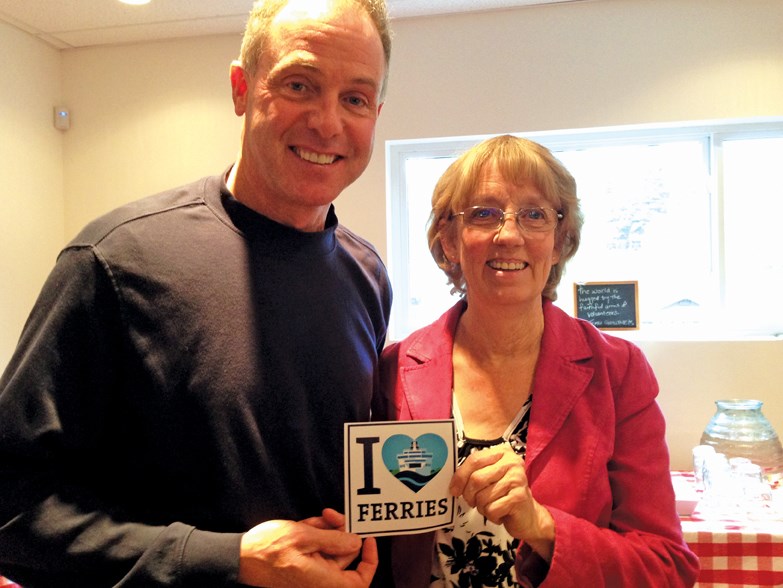Representatives from BC Ferries and the Sunshine Coast Ferry Advisory Committee (FAC) agree the “medical assured loading” system is too cumbersome, but treating TAP (Travel Assistance Program) forms as reservations isn’t the answer.
When the issue was raised at the FAC’s Nov. 3 meeting, chair Diana Mumford noted that there are as many as 3,000 TAP-funded trips on the Langdale route every month, largely because, on top of trips for surgery and treatments like chemotherapy, almost every Sunshine Coast patient who has to see a specialist needs to go to the city.
“That would be a huge impact on BC Ferries if these were all assured loading,” Mumford said, adding that the FAC is uncomfortable with advocating for every TAP traveller to be guaranteed loading.
BC Ferries does have a system for medical assured loading, but it requires the patient’s doctor to send a letter to customer service, which then issues a letter that can presented at the terminal. Mumford said that system puts all the onus on the doctors and can take a long time, which doesn’t help in situations where a patient is released on short notice from hospital, or gets sent home after surgery, and wants to get on the next available ferry.
BC Ferries CEO and president Mark Collins agreed that “we need something that’s more efficient, something that works, something that better meets the needs of travellers in a critical situation.”
He said, in the long term, the company’s plan for more flexible and cost-free reservations could address many of the issues, but those changes are still years away.
“We’ll take away our process and see what we can do to streamline it and make it more responsive,” Collins promised.
FAC member Mathew Wilson also suggested the committee and BC Ferries contact Vancouver Coastal Health to see what can be done to make sure doctors and staff at medical facilities on the Lower Mainland are aware of how TAP and the medical assured loading options work.
Sechelt councillor Alice Lutes, who was observing the meeting from the public gallery, described a situation early last year when she saw a walk-on passenger, recently released from hospital and wearing slippers, a nightgown and a coat, left behind because they’d just missed the ticket sales cut-off.
“You have to look at the human issue here, not numbers, passengers and forms,” she said. “That would be an easy call for a ticket agent to make if you gave them the authority to use some humanity.”
Langdale parking
Collins told the committee that BC Ferries plans to move toward market level prices for parking, which is currently $2.25 for 16 hours and $4.50 for 24 hours (compared to $16 in Horseshoe Bay).
He said the lot isn’t being used “efficiently” right now, and Sunshine Coast Transit is concerned that with rates so low there’s no incentive to use public transportation.
According to Collins, the company is able to add about two-dozen spaces to the 298 in the existing lot. It will also turn over management of the lot to a contractor.
Express loading
The practice of express loading has been a bone of contention on the Langdale route recently. In order to keep ships on time, or keep delays from getting worse, a ferry will leave with some space on deck, even when there are still cars in the lot.
“There are times when there are a lot of vehicles left at the terminal and there’s a fair amount of space left on the ferry, and I know residents are seeing that and feeling very frustrated by that,” said Mumford.
Ferries officials at the meeting defended the system, saying it comes down to a choice of inconveniencing a small number of travellers to avoid causing headaches for a larger number, because of the problems even a few minutes delay can cause at Horseshoe Bay during peak times.
Chris Morris, regional manger for terminal operations, said the goal is to leave no more than 10 spaces on deck if they have to make a faster turnaround.
Collins said the need to use express loading should drop significantly when a new schedule with more turnaround time between sailings goes into effect in January.
Smoking ban
The smoking ban is due to come into force Jan. 22, 2018, and Collins clarified the rules by confirming the ban will extend to cars parked at the terminals. He said BC Ferries is one of the last transportation systems in the country to go smoke free.
Collins said enforcement will be treated in much the same way as they’ve been dealing with the rule around staying on lower car decks and he expects very few people to ignore the ban.
“Our responsibility is to inform people it’s a non-smoking area. If we face a difficult situation or a belligerent situation, our employees are being instructed to back off and inform their supervisor.”



